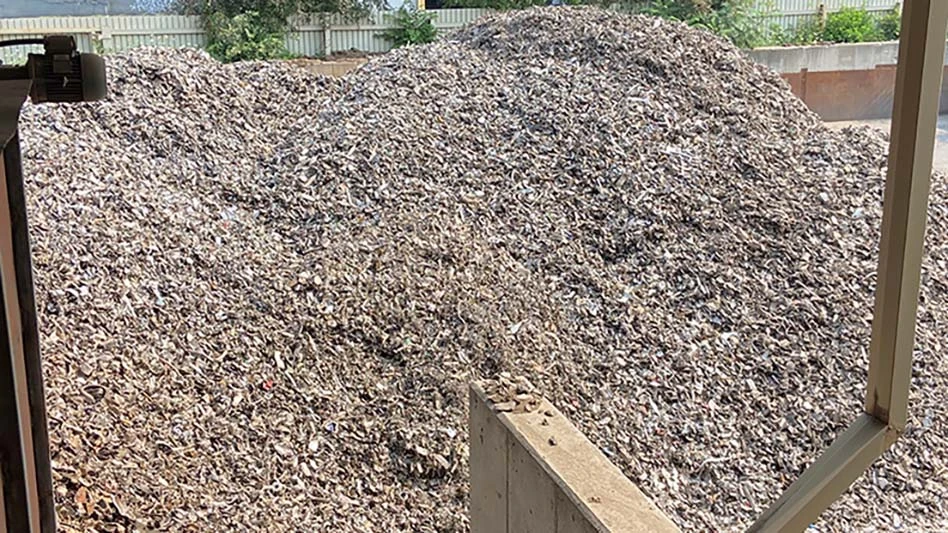
Getting the right physical properties—melt flow, impact resistance and odor—can be challenging with recycled content, but additives can offer solutions to these challenges. In recent months, Britec Solutions Inc. of Tyler, Texas, and Sukano Polymers Corp., which is based in Switzerland with U.S. headquarters in Duncan, South Carolina, have released new additives that can help recyclers boost recycled resin performance.
Britec Solutions
Britec Solutions’ BTec REA360 Regrind Enhancing Additive improves the physical properties of recycled polymers, controls or eliminates odors and enhances processing performance, the company says.
Britec Solutions’ data show the physical properties of regrind and recycled resins are restored to levels similar to virgin grades of polypropylene (PP) and polyethylene (PE) at very low use rates of BTec REA360 ranging from 0.1 percent to 0.5 percent. Injection molders, blow molders, compounders, recyclers and extrusion processors using the additive can significantly increase the volume of regrind used without a loss of performance while also increasing processing efficiencies, according to the company.
BTec REA360 is available in pellet and liquid form, and it disperses easily in PP and PE, according to Britec Solutions.
When properly incorporated into a polymer, the additive’s benefits include:
- enhancing processing performance;
- improving physical properties of regrinds and recycled resins;
- protecting against polymer oxidation during processing;
- preventing discoloration;
- increasing output efficiencies;
- eliminating nitrogen- and sulfur-based odors; and
- stabilizing melt fracture in recycling and extrusion processes.

BTec REA360 is U.S. Food and Drug Administration compliant for use in direct-food-contact applications. The company introduced the product in mid-2020.
A recycler in Texas, while reprocessing high-density polyethylene consisting of mixed color and mixed melt post- consumer regrind and 2 percent carbon black color concentrate, reported improved physical properties from the addition of BTec REA360, according to Britec Solutions. The recycler added 0.03 percent BTec REA360 to its regrind feedstock, and the Izod impact strength improved by 37 percent, while the flexural modulus improved by more than 30 percent, according to the company. In addition, melt flow was enhanced and stabilized, which contributed to an increase in production output of more than 18 percent.
An Ohio-based injection molder increased the regrind content of a PP molded living-hinge closure component from 10 percent to 75 percent with the addition of 0.05 percent BTec REA360. This allowed regrind from a larger nonrelated part to be incorporated. As a result, the injection molder decreased resin costs and increased production rates by 4 percent.
Sukano
Sukano produces additives, color masterbatches and compounds for polyester and specialty resins. The company recently launched its transparent Impact Modifier Masterbatches for plastic food trays.

The Impact Modifier Masterbatches allow processors to replace specialized co-polyester resins with recycled or virgin polyethylene terephthalate (PET). As a result, producers can replace traditional nonrecyclable frozen food trays with PET monomaterial structures that are recyclable. The masterbatches also allow for increased recycled PET (rPET) content.
“With our newly formulated Sukano Impact Modifier Portfolio, customers have a recyclable alternative at hand to replace products made of, for instance, co-polyester or GAG film structures,” says Alessandra Funcia, head of marketing at Sukano. GAG is a PET glycol/amorphous PET/PET glycol co-extruded film structure.
The new Sukano Impact Modifier Masterbatches are being launched under the Sukano rPET Product Portfolio umbrella.
Food trays manufactured with the masterbatches offer improved durability and toughness, enhanced impact resistance, higher rPET content and shatter resistance without a loss in transparency, according to the company. It also improves packaging safety by reducing the risk of shards that could contaminate packaged food and present consumers with sharp edges. In addition, productivity and yield are improved by avoiding line interruptions, generating more first-quality parts.
“Our latest development, the Sukano Impact Modifier Portfolio, allows transparent trays for cold [and] flash-frozen [foods] and room-temperature trays to be fully recyclable,” says Michael Kirch, global head of research and development at Sukano.
Sukano’s rPET portfolio is designed to encourage sustainability and recyclability, according to the company. PET recycling saves 83 percent of the energy and 70 percent of the carbon dioxide emissions required to produce PET from virgin materials.
Get curated news on YOUR industry.
Enter your email to receive our newsletters.

Explore the Spring 2021 Plastics Recycling Issue
Check out more from this issue and find your next story to read.
Latest from Recycling Today
- Ship dismantlers navigate new regulatory regimen
- Gershow announces several community involvement projects
- McKinsey identifies engineering polymers as a recycling opportunity
- Metso acquisition focuses on mill liner recycling
- Malaysian customs office seizes scrap containers
- Lindner establishes Brazil subsidiary
- Tire recycling veteran predicts growth in pyrolysis
- ShearCore adds FC95 to concrete processor line





